Titan (India) Bundle
Who Really Owns Titan Company (India)?
Understanding a company's ownership is key to grasping its future. Titan Company, a leading name in the Indian market, offers a fascinating case study. From its roots as a joint venture to its current status, the evolution of Titan's ownership tells a compelling story of growth and strategic direction.
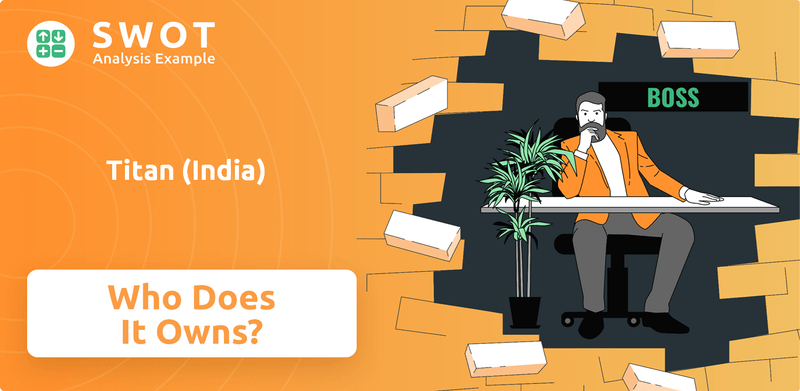
Founded in 1984 as a collaboration between the Titan (India) SWOT Analysis and the Tamil Nadu Industrial Development Corporation (TIDCO), Titan Company has transformed the Indian watch market and expanded into jewelry brands and other luxury goods. Today, it's a major player, making it crucial to examine the Titan ownership structure. This includes exploring the influence of the Tata Group, institutional investors, and public shareholders to understand the company's trajectory. The company's headquarters are located in Electronic City, Bangalore.
Who Founded Titan (India)?
The story of Titan Company (Titan India) began in 1984 as Titan Watches Limited. It was a joint venture, marking the start of a significant player in the Indian watch market.
The collaboration brought together Tata Industries and the Tamil Nadu Industrial Development Corporation (TIDCO). This partnership was crucial in establishing Titan ownership and its early direction.
Xerxes Desai was the driving force behind Titan's inception, serving as its first Managing Director. His vision was key to shaping the company's operational framework.
Titan Company emerged from a joint venture between the Tata Group and TIDCO. This partnership was designed to leverage the strengths of a major industrial group and a state-owned development corporation.
Xerxes Desai, a graduate of Elphinstone College and Oxford University, was instrumental in proposing the watchmaking venture. He joined Tata Administrative Services in 1961.
The primary goal was to reduce India's dependence on foreign watch brands. The aim was to establish a domestic manufacturing base capable of producing high-quality timepieces.
While specific initial equity splits are not publicly detailed, the foundation was a partnership between Tata and TIDCO. Early agreements defined operational and financial contributions.
Xerxes Desai led the charge in establishing the company's operational framework and market entry strategy. This ensured a strong start in the competitive Indian watch market.
The founding team focused on quality and innovation. This focus was central to the distribution of control and laid the groundwork for future growth.
The early days of Titan Company highlight a strategic partnership aimed at self-reliance and quality. The collaboration between the Tata Group and TIDCO was crucial. The leadership of Xerxes Desai was pivotal in shaping the company's direction.
- Titan India started as a joint venture.
- The Tata Group and TIDCO were the primary stakeholders.
- Xerxes Desai was the first Managing Director.
- The focus was on building a domestic watch manufacturing base.
Titan (India) SWOT Analysis
- Complete SWOT Breakdown
- Fully Customizable
- Editable in Excel & Word
- Professional Formatting
- Investor-Ready Format
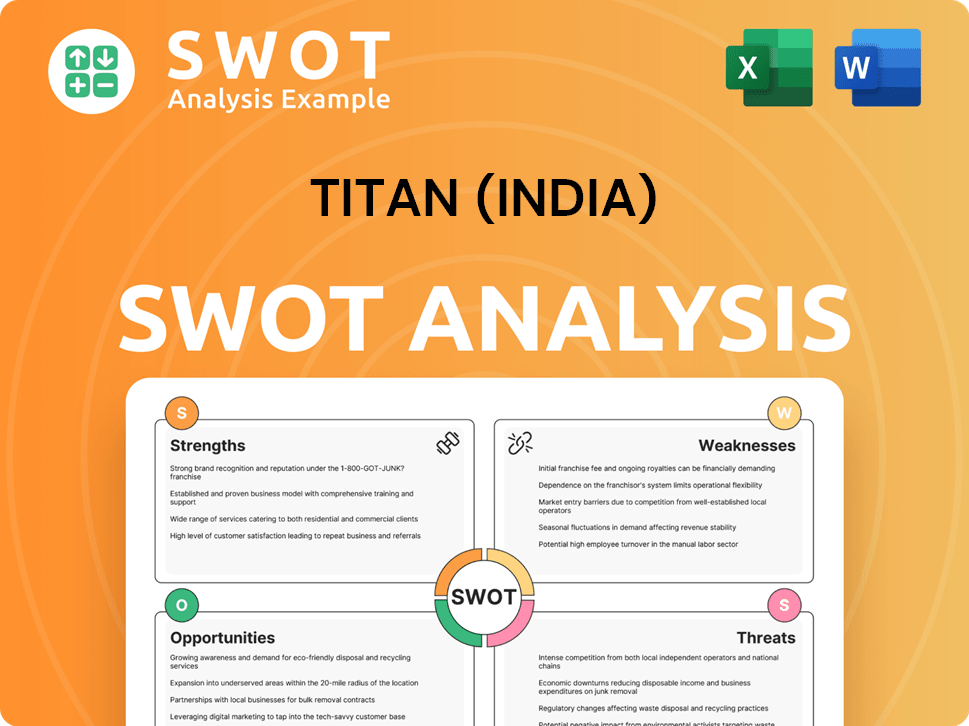
How Has Titan (India)’s Ownership Changed Over Time?
The ownership structure of Titan Company (India) has evolved significantly since its inception. Initially a joint venture, the company's ownership has shifted over time, with the Tata Group and Tamil Nadu Industrial Development Corporation Limited (TIDCO) playing key roles. The current structure reflects a blend of promoter holdings, institutional investments, and public shareholding, shaping the company's strategic direction and financial performance. Understanding this ownership evolution is crucial for investors and stakeholders alike, providing insights into the company's stability and future prospects.
As of March 2025, the promoter group maintains a substantial stake in Titan Company. TIDCO holds a significant 27.88% stake, while Tata Sons Private Limited holds 20.84%. The broader Tata Group's total equity stake, including various entities, reached 25.02% as of June 30, 2024. This strong promoter backing underscores the long-term commitment to the company. The company's strategic decisions, including acquisitions and expansions, are often influenced by these major stakeholders, impacting its overall market position and financial health.
| Shareholder Category | Stake as of March 31, 2025 | Stake as of December 2024 |
|---|---|---|
| Promoters | 52.90% | Not Available |
| Foreign Institutional Investors (FIIs) | 17.82% | 18.11% |
| Domestic Institutional Investors (DIIs) | 11.90% | 11.26% |
| Public and Others | 17.38% | Not Available |
Institutional and individual investors also hold significant stakes in Titan Company. FIIs held 17.82% as of March 2025, while DIIs increased their holdings to 11.90%. Within DIIs, Mutual Funds held 6.41%, and Insurance Companies held 4.75% as of March 2025. Key individual shareholders include Rekha Jhunjhunwala with 4.08% and Life Insurance Corporation of India with 2.34%. These shifts highlight the dynamic nature of the shareholding pattern and investor confidence in the company's performance, especially considering its strong presence in the Indian watch market and jewelry brands.
The ownership of Titan Company is primarily controlled by the Tata Group and TIDCO.
- Promoters hold a significant stake, ensuring stability.
- Institutional investors play a crucial role in the shareholding pattern.
- Public and other shareholders also influence the company's direction.
- The company's financial performance is heavily influenced by its jewellery segment.
Titan (India) PESTLE Analysis
- Covers All 6 PESTLE Categories
- No Research Needed – Save Hours of Work
- Built by Experts, Trusted by Consultants
- Instant Download, Ready to Use
- 100% Editable, Fully Customizable
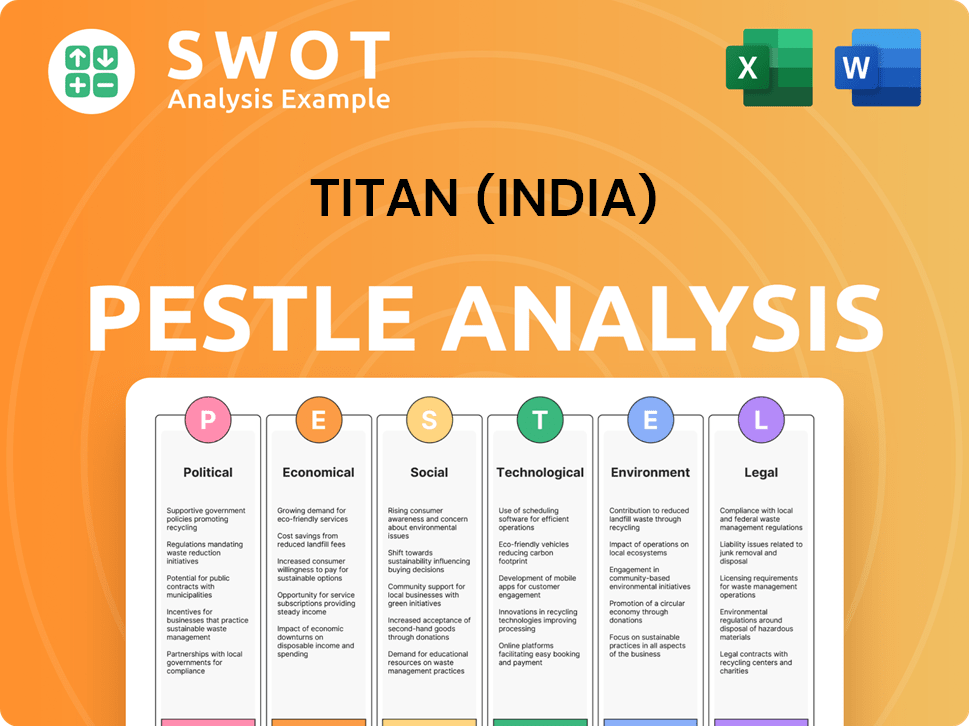
Who Sits on Titan (India)’s Board?
The Board of Directors at Titan Company Limited oversees the company's operations, representing the interests of various stakeholders. While specific details about each board member's shareholding aren't provided in the search results, the involvement of the Tata Group and TIDCO indicates strong corporate governance. As of March 2025, the promoter group, including TIDCO and Tata Sons, holds a significant 52.90% stake, giving them considerable influence over strategic decisions and board appointments. Arun Roy is the Chairman of the Board, and C.K. Venkataraman serves as CEO and Managing Director.
Titan Company operates under corporate governance standards, typical for publicly listed Indian companies. The company's commitment to transparent investor relations is evident through regular meetings with analysts and investors. This helps to ensure that all stakeholders are informed about the company's performance and future plans. The presence of Foreign Institutional Investors (17.82% as of March 2025) and Domestic Institutional Investors (11.90% as of March 2025) also suggests a diverse set of interests are represented.
| Board Member | Position | Note |
|---|---|---|
| Arun Roy | Chairman | Oversees the board's activities. |
| C.K. Venkataraman | CEO & Managing Director | Leads the company's day-to-day operations. |
| TIDCO and Tata Sons | Promoter Group | Holds a majority stake, influencing strategic decisions. |
The shareholding structure of Titan Company reveals key aspects of its ownership. The promoter group, primarily comprising TIDCO and Tata Sons, holds a controlling stake, which gives them significant influence. Institutional investors, both foreign and domestic, also have substantial holdings, reflecting a diverse investor base. For more insights, you can explore the Growth Strategy of Titan (India).
Titan Company's ownership structure is primarily influenced by the Tata Group and TIDCO, who hold a significant majority stake. This ownership structure ensures strong corporate governance and strategic direction. The presence of institutional investors further diversifies the shareholder base.
- Tata Group and TIDCO are the primary owners of Titan Company.
- Institutional investors hold a significant portion of the shares.
- The board of directors plays a crucial role in governance.
- The company is committed to transparent investor relations.
Titan (India) Business Model Canvas
- Complete 9-Block Business Model Canvas
- Effortlessly Communicate Your Business Strategy
- Investor-Ready BMC Format
- 100% Editable and Customizable
- Clear and Structured Layout
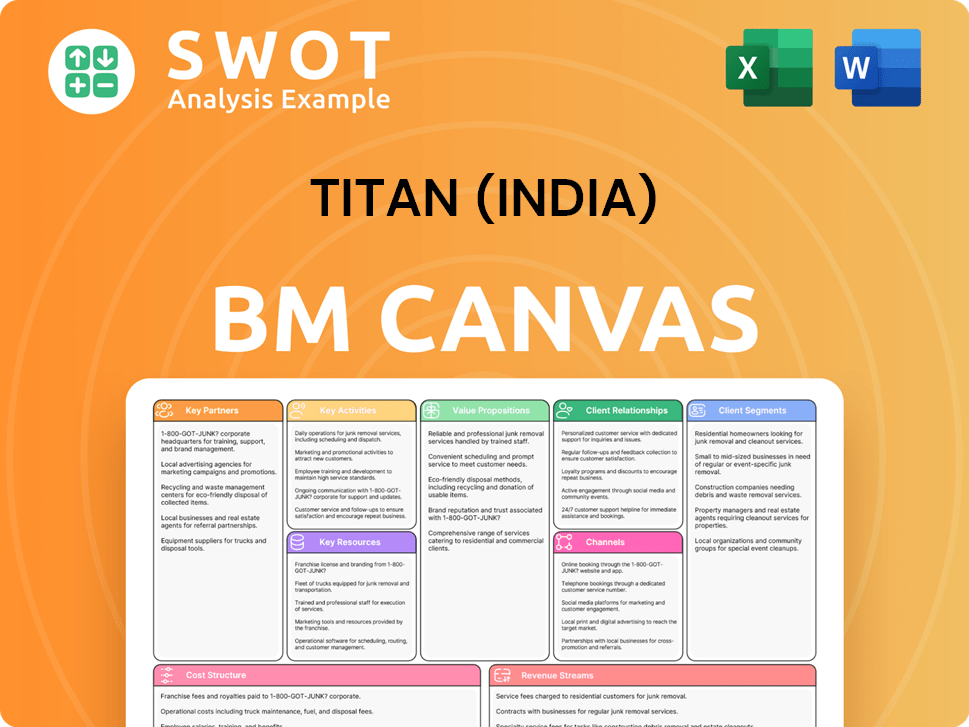
What Recent Changes Have Shaped Titan (India)’s Ownership Landscape?
Over the past few years, Titan Company has strategically expanded and adapted its ownership profile. In February 2024, the company increased its stake in CaratLane Trading Private Limited by acquiring an additional 0.36% from individual shareholders for approximately INR 600 million. This move reflects a trend of consolidating ownership in key subsidiaries, particularly in the jewellery segment, which significantly contributes to its revenue. Additionally, Titan completed the liquidation of its subsidiary TCL Watches Switzerland AG as of March 21, 2024, streamlining its international operations.
In terms of leadership, Mr. Naveen Dadlani was appointed as the Head of Integrated Retail Services Group in December 2024, with the previous incumbent continuing until March 31, 2025, for a smooth transition. This signifies ongoing executive changes aimed at boosting operational efficiency. The company's revenue for FY25 crossed the INR 50,000 crore milestone, with a 22% growth over FY24, primarily driven by the jewellery segment. Titan has also expanded its international business in North America and GCC regions.
| Ownership Category | December 2024 | March 2025 |
|---|---|---|
| Foreign Institutional Investors (FIIs) | 18.11% | 17.82% |
| Domestic Institutional Investors (DIIs) | 11.26% | 11.90% |
| Public | 70.63% | 70.28% |
Industry trends impacting Titan include increased institutional ownership. While Foreign Institutional Investors (FIIs) saw a slight decrease from 18.11% in December 2024 to 17.82% in March 2025, Domestic Institutional Investors (DIIs) increased their holdings from 11.26% to 11.90% in the same period. This indicates growing confidence from domestic institutions in Titan's performance and future prospects. The company's proactive investor engagement, with scheduled meetings with prominent domestic and international institutional investors in June 2025, highlights its commitment to transparency.
The ownership of Titan Company is primarily held by the Tata Group, with a significant portion of shares available in the public market. The company's shareholding pattern includes institutional investors and public shareholders.
Recent acquisitions, such as the increased stake in CaratLane, demonstrate Titan's strategy to strengthen its market position, particularly in the jewellery sector. This consolidation enhances its overall business portfolio.
Domestic Institutional Investors (DIIs) have increased their holdings in Titan, reflecting growing confidence in the company's performance and future prospects. This trend is a positive indicator.
Titan's revenue for FY25 surpassed INR 50,000 crore, with a 22% growth, driven mainly by its jewellery segment. The company is also expanding its international business in key regions.
Titan (India) Porter's Five Forces Analysis
- Covers All 5 Competitive Forces in Detail
- Structured for Consultants, Students, and Founders
- 100% Editable in Microsoft Word & Excel
- Instant Digital Download – Use Immediately
- Compatible with Mac & PC – Fully Unlocked
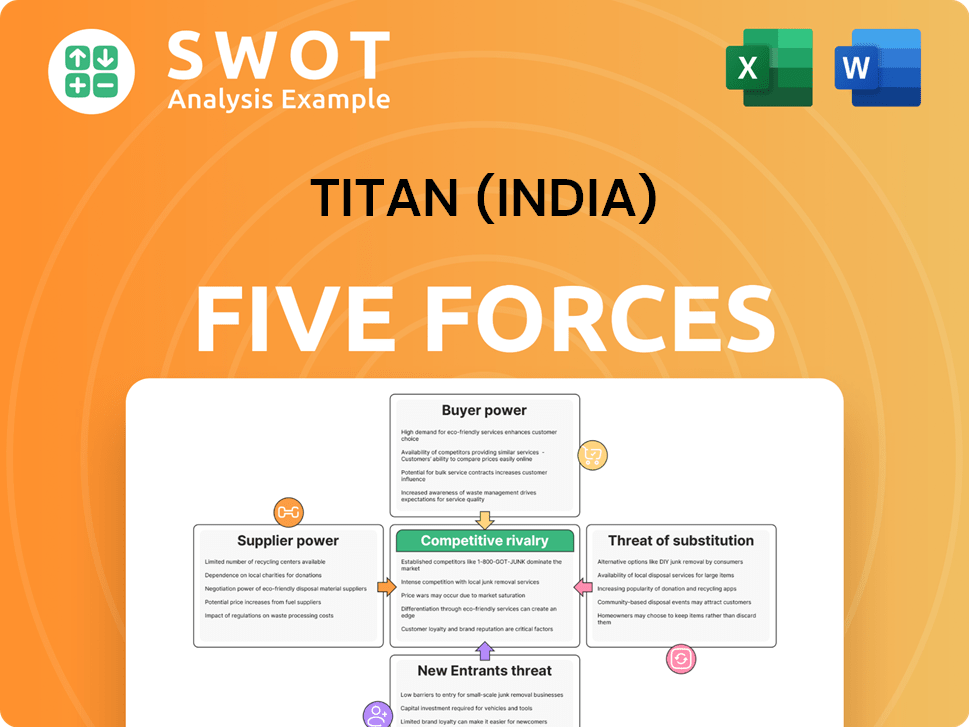
Related Blogs
- What are Mission Vision & Core Values of Titan (India) Company?
- What is Competitive Landscape of Titan (India) Company?
- What is Growth Strategy and Future Prospects of Titan (India) Company?
- How Does Titan (India) Company Work?
- What is Sales and Marketing Strategy of Titan (India) Company?
- What is Brief History of Titan (India) Company?
- What is Customer Demographics and Target Market of Titan (India) Company?
Disclaimer
All information, articles, and product details provided on this website are for general informational and educational purposes only. We do not claim any ownership over, nor do we intend to infringe upon, any trademarks, copyrights, logos, brand names, or other intellectual property mentioned or depicted on this site. Such intellectual property remains the property of its respective owners, and any references here are made solely for identification or informational purposes, without implying any affiliation, endorsement, or partnership.
We make no representations or warranties, express or implied, regarding the accuracy, completeness, or suitability of any content or products presented. Nothing on this website should be construed as legal, tax, investment, financial, medical, or other professional advice. In addition, no part of this site—including articles or product references—constitutes a solicitation, recommendation, endorsement, advertisement, or offer to buy or sell any securities, franchises, or other financial instruments, particularly in jurisdictions where such activity would be unlawful.
All content is of a general nature and may not address the specific circumstances of any individual or entity. It is not a substitute for professional advice or services. Any actions you take based on the information provided here are strictly at your own risk. You accept full responsibility for any decisions or outcomes arising from your use of this website and agree to release us from any liability in connection with your use of, or reliance upon, the content or products found herein.